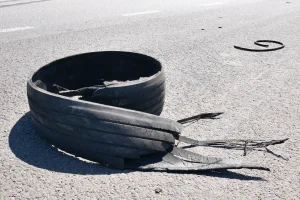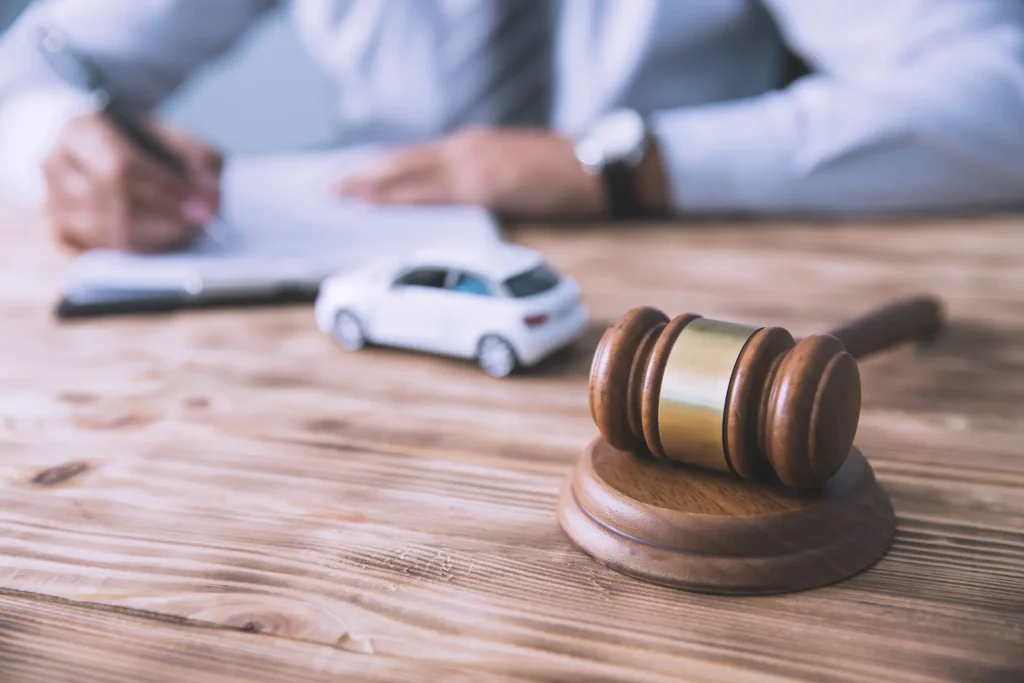What to Do During a Tire Blowout

A tire blowout can turn a normal drive into a dangerous situation in seconds. The sudden loss of air pressure can cause your vehicle to become unstable and difficult to steer, potentially leading to a loss of control. Depending on the circumstances, the vehicle may swerve, skid, or even roll over – it’s a situation that can quickly escalate, potentially leading to severe injuries or even fatalities.
For Texas drivers, understanding how to handle a tire blowout is crucial for maintaining safety on our busy highways and roads. With the right knowledge and preparation, hopefully you can reduce the risk of an accident. In the unfortunate event that a tire blowout leads to an accident or injury, it’s important to know your rights and options.
The Callahan Law Firm understands the complexities of Texas liability laws and is committed to helping you navigate any legal challenges that may arise if you have been involved in a tire blowout accident. We are here to stand by your side when accidents occur.
Common Causes of Tire Blowouts
Understanding what causes a tire to blow out is crucial for prevention and safety. While some factors are beyond our control, many tire blowouts can be avoided with proper care and attention. Let’s explore the common causes:
- Natural Wear and Tear: Tires degrade over time, with tread wearing down and increasing the risk of blowouts, especially at high speeds. Regular inspections can catch worn tires before they become hazardous.
- Improper Maintenance: Neglecting tire pressure, alignment, and rotation can lead to issues. Underinflated or overinflated tires are prone to blowouts due to uneven wear or excessive heat.
- Overloading: Carrying more weight than your tires can handle stresses them, making blowouts more likely, particularly at high speeds.
- External Factors: Hazards like sharp debris or potholes can puncture or damage tires. Extreme temperatures can also affect tire pressure, leading to blowouts.
Tips for Preventing Tire Blowouts
Your tires are the only part of your vehicle that touches the road, so taking care of them is vital for your safety. Here is how you can reduce the risk of tire blowouts:
- Check tire pressure periodically and before long trips.
- Rotate tires according to manufacturer recommendations.
- Replace tires when the tread depth becomes too low.
- Be aware of your vehicle’s weight limits.
- Avoid overloading, especially during highway travel.
- Stay alert for road hazards that could damage your tires.
Regular tire inspections and proper maintenance are important to preventing tire blowouts. By monitoring the quality of your tires and using these prevention methods, you can significantly reduce the risk of a blowout on the highway.
Immediate Steps After Experiencing a Tire Blowout
Tire blowouts can happen unexpectedly, knowing what to do during a tire blowout can make the difference between a minor scare and a serious accident. When you experience a tire blowout while driving, especially on a highway, here are steps recommended by tire safety experts that you should follow:
- Stay Calm: Remain calm to avoid losing control of the vehicle.
- Maintain Control: Firmly grip the steering wheel. Avoid slamming on the brakes; gently ease off the accelerator instead.
- Gradually Reduce Speed: Let the vehicle slow down naturally by taking your foot off the gas, then apply brakes gently once you’re under 30 mph.
- Steer to Safety: Guide the vehicle to the shoulder or median and turn on hazard lights to alert others.
- Come to a Stop: Stop in a safe location. Keep hazard lights on, and exit the vehicle only if it’s safe.
- Assess the Situation: Check your surroundings before exiting. If on a busy highway, stay inside and call roadside assistance.
- Check for Injuries: Ensure everyone is safe and call for medical help if needed.
By following these steps, you increase your chances of handling a tire blowout on the highway safely and reducing the risk of a serious accident. In the event that a tire blowout leads to an accident, contact The Callahan Law Firm. We can discuss your rights and take steps to help you navigate the legal aspects of any claim you may have, especially if the blowout was caused by factors beyond your control, such as manufacturing defects.
Contacting Roadside Assistance or Emergency Service
Once you’ve safely maneuvered your vehicle to the side of the road following a tire blowout, it’s important to get the right help.
Roadside Assistance
If you have a tire blowout while driving on the highway or any other road, roadside assistance programs can provide immediate help. Here are some options to consider:
- AAA (American Automobile Association): AAA offers 24/7 roadside assistance for members, including tire changes, towing, and other emergency services. If you’re a member, contacting AAA should be one of your first steps.
- Insurance Carriers: Many auto insurance policies include roadside assistance as part of their coverage. Check your policy details or contact your insurance provider to see if you’re eligible for these services. They can send help directly to your location.
- Manufacturer Assistance Programs: Some vehicle manufacturers offer complimentary roadside assistance for a certain period after purchasing a new car. If your vehicle is still under warranty, this could be a valuable resource.
- Local Tow Companies: If you don’t have a roadside assistance plan, you can contact a local towing company directly. They can provide tire blowout repair or towing services to a nearby shop.
When contacting roadside assistance, be prepared to provide the following information:
- Your exact location.
- A description of the problem.
- Your vehicle make, model, and color.
Contacting Emergency Services
In some situations, you may need to contact emergency services, such as 911, especially if the tire blowout has led to an accident, injury, or unsafe conditions. Here’s when to make that call:
- Injuries: If you or anyone else has been injured as a result of the tire blowout, call 911 immediately. Emergency medical services can provide necessary care and transport to a hospital if needed.
- Unsafe Conditions: If the tire blowout occurs in a dangerous location, such as a busy highway, and you’re unable to safely move the vehicle, call 911. Law enforcement can help manage traffic and ensure your safety.
- Accidents: If the tire blowout causes a collision with another vehicle or object, it’s essential to report the accident to the police. They can document the event and provide assistance as needed.
By knowing who to call and what steps to take after a tire blowout, you can ensure that help arrives quickly and that you and your passengers remain safe.
Legal Considerations and Actions

Tire blowouts can lead to serious accidents, causing serious and catastrophic injuries. Understanding the legal implications is crucial for protecting your rights and ensuring that you receive full compensation under the law. If you or a loved one has been involved in an accident caused by a tire blowout, it’s important to take the right legal steps and seek professional advice from experienced car accident attorneys at The Callahan Law Firm.
Legal Implications of Tire Blowouts
When a tire blowout leads to an accident, legal issues will arise including questions of liability. Determining who is at fault can be complex and may involve multiple parties, such as:
- The Driver: If a tire blowout results from improper maintenance, such as driving on worn or underinflated tires, the driver may be held partially or fully responsible for the accident.
- The Tire Manufacturer: If the blowout is due to a defect in the tire, the manufacturer could be liable for damages. This is often the case in situations where a recall has been issued for faulty tires.
- The Tire Seller or Distributor: Companies who put a defective tire in the stream of commerce can be held liable under Texas product liability law.
- Other Parties: In some cases, external factors like road debris, poor road maintenance, or improper tire installation by a mechanic could contribute to a tire blowout. Depending on the circumstances, these parties may also be held accountable.
Knowing who is legally responsible is essential for protecting your rights and pursuing full compensation under the law. This requires a thorough investigation, including obtaining and examining the tire and the vehicle, retaining appropriate experts including an accident reconstructionist, tire expert and possibly more, reviewing sales and maintenance records, and analyzing the accident scene.
Potential Compensation
People harmed in accidents caused by tire blowouts may be entitled to various forms of compensation under the law, depending on the circumstances of the case. This can include:
- Medical Expenses
- Lost Wages
- Physical Impairment
- Mental Anguish
- Pain and Suffering
Stay Safe and Informed: Protect Yourself on the Road
Tire blowouts can happen to anyone, but knowing how to handle them can make all the difference. By understanding the potential causes and what to do if you experience a tire blowout, the goal is to reduce the likelihood of accidents and injuries.
If you’ve been involved in an accident caused by a tire blowout, seeking legal counsel is crucial. The Callahan Law Firm is here to help you navigate the legal complexities and work to ensure you receive full justice under the law. Contact us today to schedule a no-fee consultation, and let us see how we can help you.
FAQ:
What should you do during a tire blowout?
Stay calm and firmly grip the steering wheel. Gradually reduce speed by easing off the accelerator, avoid sudden braking, and steer to a safe location, such as the shoulder of the road. Once stopped, use hazard lights and call for roadside assistance if needed.
Can a tire blowout be fixed?
As a general rule, a tire blowout cannot be repaired and requires a replacement. The damage from a blowout is too severe for a patch or repair. A professional should replace the tire to ensure your safety and proper vehicle performance.

Michael S Callahan is an attorney and founder of The Callahan Law Firm. He focuses his practice on representing individuals and families in personal injury cases involving motor vehicle and truck accidents, workplace accidents and defective products. With over 25 years of experience, he is dedicated to fighting on behalf of people whose lives have been forever altered by the negligence and carelessness of corporations and individuals. Originally trained as a mechanical engineer, Michael has been practicing law and fighting for justice for those who need it most since 1994. He is board-certified in Personal Injury Trial Law by the Texas Board of Legal Specialization and a member of various esteemed legal associations. Outside of work, Michael enjoys spending quality time with his family, outdoor activities, and continually striving to improve as a trial lawyer and human being.











